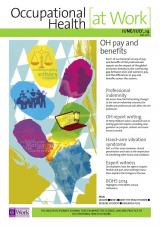June/July 2014 (vol. 11/1)
ContentsFeaturesNewsLegal
NewsResearch DigestResearch PlusCPD
Research Plus
Psychosocial job factors can raise blood pressure
Around half of the 74 studies included in a systematic review of research investigating the effect of demand–control–support (DCS) and effort–reward imbalance (ERI) models found a significant adverse effect of psychosocial work factors on blood pressure (BP) – a major risk factor for cardiovascular disease – with more consistent effects observed in men than women. Forty studies on the DCS model investigated BP, with a significant adverse effect of job strain found in 21 of them; seven out of 19 studies showed it had an adverse impact on hypertension. Of studies reporting results by gender, six out of 18 studies found an adverse effect of job strain on BP in men, whereas just one in 10 reported a deleterious effect in women. Four out of seven studies found a significant adverse effect of ERI on BP – five out of six for men, and one out of six for women. Five out of six studies also found a deleterious effect of ERI on hypertension.
Scandinavian Journal of Work Environment & Health 2014;40(2): 109–132. ohaw.co/1nohbbH
Occupational Health at Work June/July 2014 (vol. 11/1) pp43



